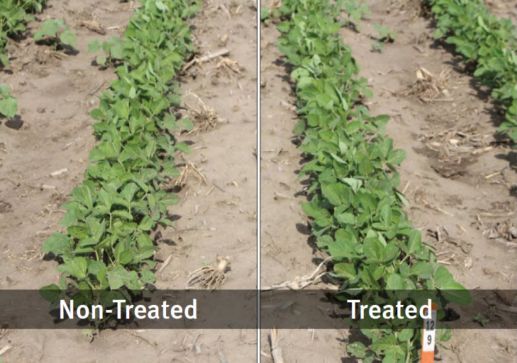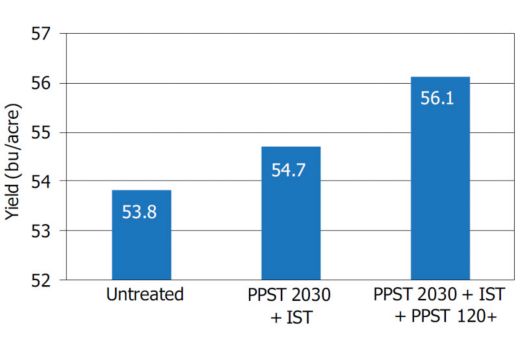Soybean seed treatment usage has increased as a way to help growers address concerns often associated with earlier planting dates. Other factors that put seedlings at a higher risk for poor emergence include no-till or reduced-till practices, cool and wet weather conditions, and heavy or compacted soils.
These factors can delay emergence and early plant development, increasing the window of vulnerability to disease and insect damage. Even minimal insect feeding can allow diseases to enter the plant, which can weaken or eventually cause plant death.
Adding a Pioneer Premium Seed Treatment (PPST) to a Pioneer® brand soybean variety adds an extra level of protection against early season insects and diseases.
EverGol™ Energy fungicide seed treatment is a next generation technology with multiple modes of action that provides enhanced protection against a broad spectrum of seed and soilborne diseases caused by Rhizoctonia solani, Fusarium spp., Pythium spp. and Phomopsis longicolla.

Figure 1. A side-by-side comparison of non-treated soybeans vs. EverGol Energy + FST/IST + PPST 2030 in 2012.
Over a 3-year period, Pioneer evaluated the performance of EverGol Energy at 57 research locations. The seed treatment combination included EverGol Energy + an FST/IST (Allegiance® fungicide + Gaucho® fungicide) + PPST 2030 (Figure 1). PPST 2030 contains a biological component and a polymer.
Results from this study showed that the treatment with EverGol™ Energy fungicide had a positive yield advantage over the non-treated check at 47 of the 57 research locations (82%). Across all locations, the 3-year average yield advantage was 1.34 bu/acre (Figure 2).

Figure 2. EverGol Energy + FST/IST + PPST 2030 yield advantage vs. non-treated checks at 57 replicated research locations from 2010-2012.
PPST 120+ is another seed treatment option available for growers. PPST 120+ is a premium on-seed inoculant plus extender product developed exclusively for Pioneer that delivers a high concentration of beneficial rhizobia bacteria to the soybean plant.
A Pioneer study was conducted in 2012 across 16 locations in Illinois and Indiana comparing seed treatment packages with and without PPST 120+. In all locations, results showed that soybeans treated with PPST 120+ yielded an average of 1.4 bu/acre more than soybeans treated without PPST 120+ and 2.3 bu/acre more than untreated seed (Figure 3).

Chart showing average yield of seed treatments across 16 testing locations in 2012.

Pioneer Premium Seed Treatment for soybeans is applied at a Pioneer production facility or by an independent sales representative of Pioneer. Not all sales representatives offer treatment services, and costs and other charges may vary. See your Pioneer sales representative for details. Seed treatment offering is exclusive to Pioneer and its affiliates.
EverGol® and Allegiance® are registered trademarks of Bayer.
Gaucho® is a registered trademark of Bayer.
Hybrid and variety responses are variable and subject to any number of environmental, disease and pest pressures. Individual results may vary.
The foregoing is provided for informational use only. Please contact your Pioneer sales professional for information and management suggestions specific to your operation.
PIONEER® brand products are provided subject to the terms and conditions of purchase which are part of the labeling and purchase documents.